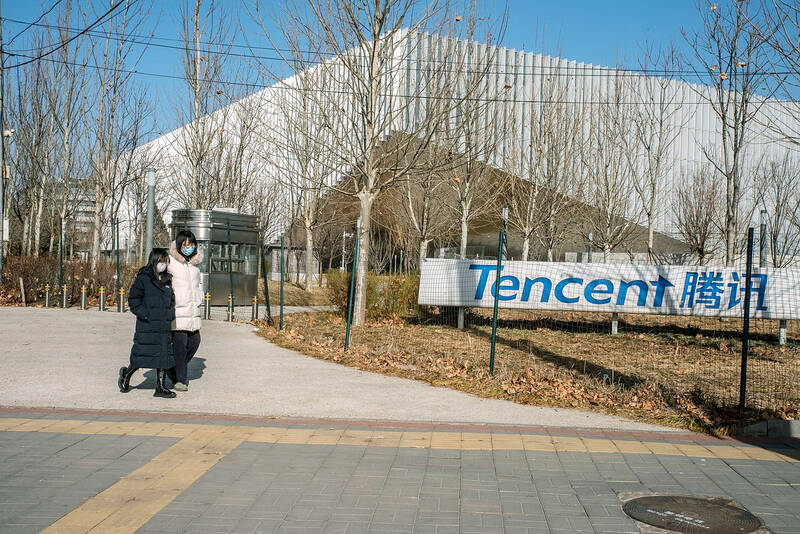Tencent Holdings Ltd (騰訊) is planning to launch a Valorant e-sports league when the hit shooter title debuts in China this year, one of the strongest signs yet that the country’s Internet giants are getting back to business after a two-year industry crackdown.
Tencent unit TJ Sports has held discussions with top Chinese e-sports players in the past few days about setting up the competition, people familiar with the matter said.
It could launch a tournament over the summer at the earliest, as Tencent rolls out the game domestically, one of the people said, asking not to be identified discussing private information.

Photo: Bloomberg
Talks are in their initial stages and Tencent could push back its timeline, the people said.
However, a Valorant league would help reboot competitive online gaming in China after a two-year lull, when COVID-19 pandemic restrictions and Beijing’s clampdown on youth addiction chilled the world’s largest gaming arena.
Launched globally in 2020, Valorant has grown to become one of the most popular e-sports titles, vying for a multibillion-dollar market along with rival shooters like Blizzard’s Overwatch. Tencent won approval to roll out the title only in December last year, in what investors took as a sign that the government was preparing to relax its grip on the sector.
A Tencent representative said in a message the company was making preparations related to Valorant and had not confirmed a launch date for the game.
A Valorant extravaganza would add to Tencent’s roster of Chinese competitive leagues, spanning genres from battle arenas to racing and first-person shooters.
Tencent set up TJ Sports with US subsidiary Riot Games Inc in 2019 to helm League of Legends contests. Another unit runs tournaments based on Honor of Kings, Tencent’s long-running mobile cash cow.
Valorant, along with the potential e-sports festivities, would help Tencent bolster a business crippled by stricter online content scrutiny. Growth for the WeChat operator has all but evaporated since 2021, when regulators began to establish curbs on everything from gaming time to undesirable content.
In December, the Chinese social media giant secured a green-light for a clutch of major releases, including Valorant and Pokemon Unite, reinforcing hopes China is easing a two-year crackdown on Big Tech.
Valorant in particular attracted attention because Beijing had in the past signaled its disapproval of violent shooting games with perceived Western cultural overtones. For instance, Tencent was forced to replace PUBG with a less gory alternative named PeaceKeeper Elite that also came with political slogans.
The League of Legends Pro League in China — operated by TJ — is the world’s largest e-sports league in terms of partnered teams and viewership. The Shanghai-based outfit has generated about US$150 million in revenue in its first two years by selling media rights, tickets and merchandise.
Outside China, Riot itself organizes three Valorant international leagues, with a collective 30 teams in places like Los Angeles, Seoul and Berlin.

Intel Corp chief executive officer Lip-Bu Tan (陳立武) is expected to meet with Taiwanese suppliers next month in conjunction with the opening of the Computex Taipei trade show, supply chain sources said on Monday. The visit, the first for Tan to Taiwan since assuming his new post last month, would be aimed at enhancing Intel’s ties with suppliers in Taiwan as he attempts to help turn around the struggling US chipmaker, the sources said. Tan is to hold a banquet to celebrate Intel’s 40-year presence in Taiwan before Computex opens on May 20 and invite dozens of Taiwanese suppliers to exchange views

Application-specific integrated circuit designer Faraday Technology Corp (智原) yesterday said that although revenue this quarter would decline 30 percent from last quarter, it retained its full-year forecast of revenue growth of 100 percent. The company attributed the quarterly drop to a slowdown in customers’ production of chips using Faraday’s advanced packaging technology. The company is still confident about its revenue growth this year, given its strong “design-win” — or the projects it won to help customers design their chips, Faraday president Steve Wang (王國雍) told an online earnings conference. “The design-win this year is better than we expected. We believe we will win

Chizuko Kimura has become the first female sushi chef in the world to win a Michelin star, fulfilling a promise she made to her dying husband to continue his legacy. The 54-year-old Japanese chef regained the Michelin star her late husband, Shunei Kimura, won three years ago for their Sushi Shunei restaurant in Paris. For Shunei Kimura, the star was a dream come true. However, the joy was short-lived. He died from cancer just three months later in June 2022. He was 65. The following year, the restaurant in the heart of Montmartre lost its star rating. Chizuko Kimura insisted that the new star is still down

While China’s leaders use their economic and political might to fight US President Donald Trump’s trade war “to the end,” its army of social media soldiers are embarking on a more humorous campaign online. Trump’s tariff blitz has seen Washington and Beijing impose eye-watering duties on imports from the other, fanning a standoff between the economic superpowers that has sparked global recession fears and sent markets into a tailspin. Trump says his policy is a response to years of being “ripped off” by other countries and aims to bring manufacturing to the US, forcing companies to employ US workers. However, China’s online warriors